|
|
|
Sort Order |
|
|
|
Items / Page
|
|
|
|
|
|
|
| Srl | Item |
| 1 |
ID:
156525
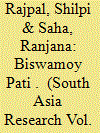

|
|
|
| 2 |
ID:
156529
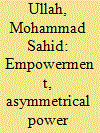

|
|
|
|
|
| Summary/Abstract |
In the wider context of growing digitalisation in South Asia, this article examines the impacts of a public–private–people partnership (4Ps) information and communication technology (ICT) initiative of the Bangladesh government, administered through local governmental offices, the Union Information Service Centre (UISC). Scrutinising the operation of six UISCs in rural communities across Bangladesh, the study researches the potential of ICTs to influence existing asymmetrical power relations and empower local people. Asking to what extent ICTs enable more people to actively participate in their communities and what the implications for empowerment are, it is found that top-down ICT intervention by itself cannot bring substantial change for people at the bottom of the social pyramid. Asymmetrical power relations continue to deprive marginalised groups from receiving the claimed benefits of ICT facilities. The study suggests the need for a more critical, practice-focused understanding of relationships between ICTs and rural empowerment, while also highlighting the changing modalities of connecting states and their citizens in postmodern South Asia.
|
|
|
|
|
|
|
|
|
|
|
|
|
|
|
|
| 3 |
ID:
156526
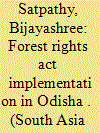

|
|
|
|
|
| Summary/Abstract |
The Forest Rights Act (FRA) 2006 claims to devolve ownership to local forest dwellers in India, to provide local communities with better tenurial security and allow increased rights over forest resources. One argument for this is the redressal of historical injustices, particularly to tribal people. Offering a reality check, this article scrutinises the interface of informal and formal institutions with respect to livelihood of forest-dependent communities and forest conservation to identify ongoing implementation challenges. Empirical data from two villages of Mayurbhanj district in Odisha use oral history, focus group discussions and in-depth interviews with different actors in FRA implementation as evidence. Asymmetric information flow, deficient coordination, undemocratic participation, dearth of transparency and lack of accountability at various levels hinder FRA implementation, which claims to safeguard the basic rights of disempowered local people, but does not appear to deliver ‘complete justice’.
|
|
|
|
|
|
|
|
|
|
|
|
|
|
|
|
| 4 |
ID:
156528
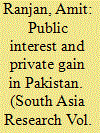

|
|
|
|
|
| Summary/Abstract |
Despite labels like ‘failed state’ or ‘hub of terror’, Pakistan remains a somehow ‘normal’ postcolonial country. While many problems are shared by such nations, Pakistan’s complex journey into the future needs to be better understood. Among specific problems, militancy and terrorism have been mainly presented as resulting from interventions by external actors, blaming others. However, failures in internal management and (mis)-adventurous foreign policies have also led to turmoil, disrupting domestic economic development and slowing the pace of democratisation.
Assessing the scope for future developments in Pakistan, this article argues that presently Pakistan’s power elites are still not fully ready to admit having learnt from the country’s past mistakes, repeating the same to secure proclaimed public interests, at the cost of killing many of their own citizens. Yet, while the overall picture remains one of precarity, there is also considerable progress. The final analysis explores how this precarious re-balancing has been achieved and is being maintained, and what this means for the future of Pakistan and South Asia.
|
|
|
|
|
|
|
|
|
|
|
|
|
|
|
|
| 5 |
ID:
156527
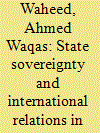

|
|
|
|
|
| Summary/Abstract |
In Pakistan, the field of international relations (IR) theory remains firmly embedded in the ‘realist’ tradition, to the detriment of a wider range of considerations. This stranglehold, strengthened by the particular evolutionary trajectory of the Pakistani state as well as a complacent academia, seems to have created a vicious circle of knowledge reproduction, reinforced by various bids for power, or proximity to it. This article scrutinises specifically the dominant understandings in Pakistan of state sovereignty and security in a broadly historical perspective, showing how the rise of the military, combined with security paranoia, has prevented academic creativity in this field, including scrutiny of recent concerns over rather close China–Pakistan links.
|
|
|
|
|
|
|
|
|
|
|
|
|
|
|
|
|
|
|
|
|